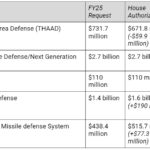Table numbers in parentheses are increases or decreases from the FY25 Request FY25 requested levels come from the Center for Arms Control and Non-Proliferation’s Fiscal Year 2025 Defense Budget Request Briefing Book Numbers may not add due to rounding Total National Defense Discretionary Spending Request (050) DOD Nuclear Weapons Funding Request for Select Programs National […]
United States
Map Shows Safest US States to Live During Nuclear War
Senior Policy Director John Erath spoke with Newsweek about safety in a nuclear war. “While those who live near military facilities, ICBM silos in the Midwest or submarine bases along the coasts might bear the most immediate and severe consequences of a nuclear attack, there’s no question: ANY nuclear war or weapons detonation would be bad […]
Op-ed: Californians must step up pressure to ensure a full cleanup of toxic Santa Susana lab
Research Analyst Shawn Rostker wrote an op-ed in Cal Matters about toxic nuclear waste at the Santa Susana Field Laboratory. Nuclear cleanup efforts across the U.S. have revealed a grim reality: the nation’s toxic nuclear waste legacy continues to endanger communities while those responsible evade accountability. At Los Alamos in New Mexico, newly exposed plutonium contamination poses […]
Comparative Summary: Fiscal Year 2025 National Defense Authorization Act
Table numbers in parentheses are increases or decreases from the FY24 Request FY25 requested levels come from the Center for Arms Control and Non-Proliferation’s Fiscal Year 2025 Defense Budget Request Briefing Book Numbers may not add due to rounding Total National Defense Discretionary Spending Request (050) DOD Nuclear Weapons Funding Request for Select Programs National […]
Heatwaves and H-Bombs: The Nuclear Triad’s Vulnerabilities to Climate Change
By Shawn Rostker Sunday, July 21, broke the record for the hottest day recorded on Earth in modern times. The following day, that record was broken again. Extreme weather events like this are occurring more frequently and with greater intensity than during any other period of recorded human existence, and the cumulative effects of climate […]

